There is a mistake that actors preparing to play Julias Caesar in Shakespeare’s seminal historical play often make. In the scene where Caesar is stabbed on the floor of the senate, they scream or shout out in agony. But any director or acting coach worth their salt will tell the actor that a person getting stabbed in the back does not respond with a scream, a shout, or any other such theatrics.
No.
The response is always a gasp. The force of a dagger entering the back completely knocks the wind out of a man. The reaction, thus, is an exhale. In the case of playing Caesar, it is a gasp of the most tragic proportions where the literal life pours out of a once proud and powerful man. The anger, the betrayal, the hopelessness, the helplessness all translate into one agonising release of breath followed by a slow but inevitable slump onto the floor.
Pakistan, and more specifically its economy, is the middle of one such gasp. Over the past week, Profit has been in contact with major industrial players all over Pakistan. Many of them ranted and raved. Others expressed shock and dismay. There were still more that had no reaction other than complete and utter resignation at the road that lies ahead.
All of them agreed on one thing: they have no idea what is going to happen but it will be bad.
Put things in context. Pakistan has for all intents and purposes given up on a deal being struck with the International Monetary Fund (IMF). The finance minister, who was responsible for messing up the process in the first place, has publicly said in his latest statement that the country cannot continue to take difficult decisions for the sake of the IMF. He has also claimed that even if the deal falls through Pakistan won’t default.
This last claim is a little difficult to digest. We currently have no money to repay our external debts in the July to December time period. Since a lot of our foreign aid is contingent on the IMF signing an agreement and releasing funds it seems next to impossible. At the same time, the government has just told the fund they will roll back their petrol cross-subsidy plan to secure the deal, indicating very strongly that they know there is no recourse without the fund being on board. It doesn’t help public sentiment that the government has been lying to the public about the state of negotiations with the IMF since February, promising that the deal is “just a few days away” for four months now.
Caught in the midst of all this are the people of Pakistan. Hounded, beleaguered, lied to, angry, and disrupted by the political chaos that has escalated in the country since the arrest of former prime minister Imran Khan, the cost of living crisis and unemployment that could rise out of a default may complete throw Pakistan into chaos and its people into despondency.
Perhaps nothing better captures the despondency than industry sentiments. The confidence of the business community is shot, and while there are many places and people to point fingers towards, the current reality is sobering. The following are a collection of comments and reactions to the ongoing political, economic, and social crisis in Pakistan from major business and industrial leaders and market experts.
You can’t be resilient in a vacuum
 Ehsan Malik
Ehsan Malik
Chief Executive Officer of the Pakistan Business Council
The PBC is a large umbrella organisation that advocates for macro policy changes that will be pro business in Pakistan. Since it has a lot of stakeholders, it does not exactly participate in strategic engagement the way the other organisations such as APTMA do. It is, in essence, a large body that represents general business interests in Pakistan. Speaking to its Chief Executive Officer, Ehsan Malik, it appeared the sentiments of the business industry are aligned with the mood of the nation.
“The steadily worsening impact of the twin-deficits plaguing Pakistan’s external and fiscal accounts has now been overtaken by a third deficit, which is the trust deficit. Trust deficit in our political leadership, establishment, judiciary, media and the elite. The latest developments are a continuation and buildup of this deficit. The IMF does not trust the current, or the previous government. Our traditionally friendly countries are shy to come forth with assistance. The politicians don’t trust each other. The judiciary is divided and the government is at loggerheads with its decisions,” he explains.
“There was never much love for bureaucrats or their control through a colonial regulatory mindset. The not-so-hidden hand of the establishment is much more visible by the day. Traders and shopkeepers are not convinced to pay taxes. State-owned enterprises bleed the economy at a growing rate, as does energy circular debt. Business is suffering from a policy rate which is intended, but has miserably failed to arrest inflation. Together with a severe import crunch, banks and E&P sector aside, the KSE-100 profits were down 36% in 1Q 2023 vs SPLY. Adjusted for inflation, they were half that of 1 Q 2022. Remittances are falling, smuggling is growing, as is the informalisation of the economy. Inflation is running away and people are losing their jobs. The country’s economy is fractured in so many ways. It is not surprising that lenders, including the IMF, are reluctant to proceed with their support programmes.”
He points out how the latest developments on arrests, riots, uncertainty on the timing of elections, as indeed the outcome of elections when/if they take place, are hardly likely to get the IMF to step forward and sign the SLA. “The more relevant (and disturbing) question is whether the economy is really the topmost priority for the government or the opposition. Neither has any clear plans for reforms and they don’t talk to each other about the economy,” he laments.
“Pakistan’s private sector is known for its resilience. However, even its ability to bounce back quickly is not going to be easy. You can’t be resilient in a vacuum. There has to be space on both the demand and supply sides. Demand is severely contracted by inflation and supply by shortage of forex reserves. We are seeing a brain drain as professionals seek opportunities abroad. There is also bound to be flight of capital as those who can will move their investments out of the country. Remaining in Pakistan carries the additional risk of higher taxes as broadening the tax base is beyond FBR’s capacity, nor is there political will for it.”
A question of exports and infrastructure
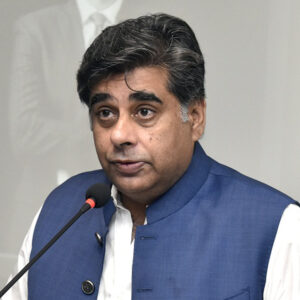 Dr. Gohar Ejaz
Dr. Gohar Ejaz
Patron in Chief of the All Pakistan Textile Mills Association
Textiles are Pakistan’s biggest export. And over the past few years, the industry has seen a major slump at a time when there is a bigger need for exports than ever before. Pakistan is the world’s 8th largest exporter of textiles in the world, and there aren’t many positive lists in the world where Pakistan is in the top 10.
It comprises 46% of the total manufacturing sector and provides employment to 40% of the total labour force. Largely, however, the textile sector is run informally and privately. Only about 5% of textile producers are publicly listed on the Pakistan Stock Exchange (PSX) with 423 textile industries operating in the country.
“We as a nation are all going through the most challenging times in the history of our country,” says Gohar Ejaz, Patron of APTMA. Ejaz is not a figure that easily makes public statements or gives interviews to the media. In his conversation with Profit, he was candid and in his alarm over where things are headed. “Textiles are the only hanging fruit in our economy to take our country forward. The cotton crop failed in 2022-23 due to weather and floods. We had a cotton crop of 5 million bales at a time when the requirement was 15 million bales. That alone set us back in a major way.”
Back in January this year, Ejaz had actually written a letter to the United States Embassy, demanding that the ambassador take their case to the federal government. The letter pointed out how the import of cotton has been severely restricted in the country because of the strict lock on lines of credits needed to import items. “The industry is running out of cotton stocks and as a consequence, our mills have either shut down or will shut down in the very near future if decisive and urgent action is not taken,” it read.
More than four months after the fact, it seems that the industry is very much in the same place. And with the added political crisis and possibility of LCs being closed much longer and even scarier possibility of default, it seems that this major export oriented sector is scared as well.
“The country’s textiles value adds 300 plus percent meaning over $1.3 billion per million bales. Last year, we exported $19.6 billion with a consumption of $6 billion in imported bales,” he adds. Essentially, the textile industry needs to import cotton to process it into a higher value product and then export it again. The government, however, does not have the money to allow them to do this leading to a standstill. “We have the potential to go to $25 billion but that will require Regional Energy Tariffs and for priority to be given to the textile industry and our cotton farmers if we are to overcome our foreign exchange obligations.”
As of now, however, these hopes seem dashed. “We have been running at 50 percent capacity for the past three months and textile exports have fallen from $19.6 billion last year to $16 billion in the year ending June’23. That means we are forgoing over $3.5 billion in possible foreign exchange.”
 Samir Chinoy
Samir Chinoy
Director & Chief Operating Officer at International Steels Limited
On the one hand are industries that are export oriented. Then there are players in industries such as steel. While it is not export oriented, the steel industry is tied intrinsically to the country’s industrial and economic growth. With a combined revenue of close to Rs 200 billion a year, steel is a major economic driver in any large economy such as Pakistan’s.
And its players are not happy.
“Unfortunately, it’s a very sad state of affairs. We’re in uncharted territories. I don’t think in my lifetime or my professional career in Pakistan that I have seen where we stand today,” says Samir Chinoy, director and COO at International Steels Limited. “We’re in a high inflationary market, interest rates are being raised to curb that, and demand is being suppressed to curb that. So it’s a challenging time.”
“Normally, you worry about selling and buying. In our case you’re also worried about the support functions of how to get financing, cash margins, and will the banks have the money to pay the documents when the suppliers present them. It’s a very interesting, and challenging time generally for all people and all industries. There is a huge contraction in demand across every sector. If we look at International Steels Limited (ISL), ISL isn’t your typical steel manufacturer. Generally in developing countries when we talk about steel, it’s construction related steel which is reebar and sarya.”
Änd it is one of those industries that is tied to everything. ISL is in the flat steel sector which is predominately used in middle class growing, and white goods industries. Their steel goes into washing machines, dryers, various appliances, two-wheelers, rickshaws, and tractors. There is a component that goes in construction, but to a lesser extent. Then the steel also goes into the rural economy which is baxay, paitiyan, baalti, dhaabray, water coolers etc.
“We’ve got a mixed bag, but I think on the industrial front where our cold rolled product goes it’s going to be tough going. Industry has shut down, or has contracted significantly. On the rural side, hopefully with better crops etc we’ll fare well,” explains Chinoy.
“I think it’s wait and see. I think it would be very unfair for me to give a view about when things will rebound because the macroeconomic conditions do not show any bounce back any time soon. We haven’t entered into an IMF program right now. II think until there’s clarity on us entering the IMF program it’s going to be very tough for anyone to make a comment on when inflationary pressures ease, when lending rates ease, or when demand starts increasing. I think it’s too soon to talk about that at the moment.”
Political uncertainty always translates to economic uncertainty
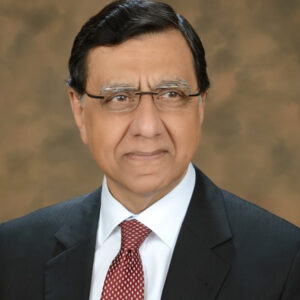 Nasim Beg
Nasim Beg
Founder Arif Habib Investments and Director Arif Habib Corporation
Nasim Beg, a senior banker and the founder of Arif Habib Investments, divided our queries into three questions.
- On the current economic and political situation:
“While we have managed to curtail imports and achieve a current account surplus, which is expected to improve next month, the fundamental economic situation remains extremely vulnerable. The import contraction is at the cost of industrial activity, which is causing pressure on jobs and at the same time, the wage earners and the salaried class in particular are facing the highest level of inflation in their working lives. The Employers are facing direct impact on the bottom lines, not only on account of reduced business activity, but extremely high borrowing costs as well.
The underlying cause of inflation was initially the supply disruption related to Covid-19, then the US-China trade war and finally the Ukraine war. In Pakistan’s case, this has been exacerbated by the very significant loss in value of the Rupee, owing to the lack of timely measures to fill the huge Current Account gap, through IMF and other arrangements. In a nutshell, the economy is currently in a very challenging situation. As regards the political situation, other than stating the obvious that it is extremely polarised, including excessive polarisation in all state institutions, political parties and the public at large, it is anyone’s guess as to which way things will settle.”
- Future outlook for the economy and political situation for the rest of 2023:
“Given the fact that the political parties are unable to come together to work out a ‘save Pakistan” plan, it is not possible to try and assess the outlook – one could run various scenarios, but one would be speculating on or trying to mindread the political leaders as well as the key people in various organs of the establishment. One can only hope that all these people in leadership positions will see the writing on the wall and sit down together and work towards a survival strategy, in the immediate to midterm, and thereafter agree on structural changes to make the economy self-sustaining for the longer term. The high level of uncertainty on the political front, translates into uncertainty on the economy from the rest of 2023.”
- On market sentiment in the finance industry (Arif Habib and its counterparts) amidst the current crisis:
“The market sentiment for the finance industry is weak to say the least – one simply has to look at the low volumes of trading at PSX, as well as shares trading at what would be considered throw away prices. The corporate earnings of the last nine months have grown by 9% despite the challenging economic conditions, however these are significantly below the growth witnessed during the preceding years. Corporates are suffering on account of supply disruptions and historically high interest rates. The only action companies like ours can take, is to remain cautious and increase our efficiency through prudent spending measures, but at the same time strive to increase our revenues both through domestic, as well as other markets.”
 Haroon Sharif
Haroon Sharif
Senior Advisor UNDP and former Chairman BoI
“Pakistan is paying a very heavy economic cost of the ongoing political instability, institutional fragmentation and uncertainty about the future course of action. The economy has already been in recession for almost a year and historically high levels of inflation, debt, dollar and overall cost of doing business is giving negative vibes to existing as well as potential investors. The Chinese government and other friendly countries have clearly communicated the need to de-escalate tensions and focus on economic revival. Pakistan’s ruling elite and bureaucracy is struggling to deal with this extraordinary economic meltdown.”
“In my opinion, the political flux will continue till a settlement on election date is reached. This will mean that Pakistan may have to miss the current IMF Program and will have to negotiate a new programme after budget. The pressure on FX reserves will remain high and the only tool available for the short term will be continuation of import compression. This will result in negative industrial activity and further job losses. So, a very tough year ahead with no policy direction to address the chronic fault lines like state owned enterprises, power sector or patronage based industry.”
“Markets and investors are losing trust in the capability of state institutions. The fundamental requirement for market confidence is basic rule of law and protection of property rights. With the current situation, a possible capital flight from an already low investment base can not be ruled out. What is needed is to empower a few key institutions like the Board of Investment, Privatisation Commission and SECP etc to deal with investor complaints. It is crucial to look after the existing investors as they are the ones who can do positive messaging. Pakistan needs to show some progress on reforms to regain confidence of friendly countries, international institutions and investors. This will only be possible if certain reforms are delegated to professionals and insulated from political interference. A few decisions will help: a) The state has no business to do commercial business; b) delegate implementation to economic institutions from ministries; and c) undertake one major reform like privatisation for instance.”
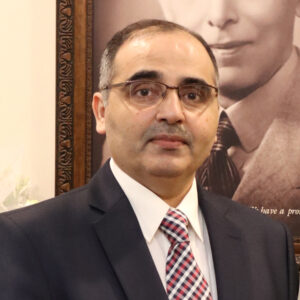 Kashif Anwar
Kashif Anwar
President Lahore Chamber of Commerce and Industry
Along with associations and industrialists, warning signs have also been coming from different commerce chambers. Speaking to Profit, the President of the Lahore Chamber of Commerce and Industry (LCCI), Kashif Anwar, warned that local investors are already backing out, let alone foreign investors.
“The current situation has had a very negative impact. We keep saying there needs to be investment and foreigners need to come in. In these conditions even locals aren’t investing. We have taken a beating first from Covid and now from the forex situation. We are already hearing that next year’s tax target might be over Rs 9000 billion then how are we expected to work?,” he asks.
“All of the indicators are negative. The Large Scale Manufacturing Index is showing regressive trends and with such policies in place industries cannot operate. As a result people will lose jobs and the condition in the country will only get worse. More than 7 million jobs have been lost just in the textile sector. This is now possibly out of the control of the politicians as well. Nothing can fix this other than all departments and stakeholders sitting together and figuring this out. The IMF is not clearing our ninth review and as a result no loans will be rolled over. Whether by hook or by crook whether it is the establishment interfering something has to be done since these are not regular conditions.”4
Are we looking at bankruptcy?
 Asfandyar Farrukh
Asfandyar Farrukh
Co-Founder Chain Store Association & Managing Director HUB
This is what it boils down to. We have up until this point seen the views of large industry sources. But with the country where it is, what happens to the shops? To the retailers? To those doing business and selling directly to customers? Over the past year, the cost of doing business has gone up, the taxation burden has risen, and people’s purchasing powers are falling. So will we now start seeing shops board up their doors?
“As far as the chain store association is concerned, we are cross cutting across textile, footwear, supermarkets, leather, books, electronics, bakeries, pharmaceuticals etc. Largely I would say that the challenges right now in the short term are supply side. Since we are non-exporters there are important imports that need to be utilised,” says Asfandyar Farrukh, the co-founder of the Chain Stores Association. “That supply is broken at the moment and we are not able to import and manufacture since we don’t even have the raw materials. For a retailer, we need to make sure our shelves are stocked. We can’t invoice or deal in black market goods. Within the documented supply chain the official imports hurt the entire supply chain.”
“We deal in leather goods for example. Things like outsoles need to be imported or procured locally through imported sources. Chemicals are required in tanneries. Then there is the cost associated with doing business. Our utility costs, salary bills, and rentals are all rising. For the last one year, our costs have risen by at least 60%. As a result, margins have dwindled. You can’t increase prices so much that your sales bottom out because people also do not have as much purchasing power now. We were hoping this would be resolved in the second quarter but we are now looking at a best case scenario where things settle in the fourth quarter. That will require political stability and as a result there will be some kind of delay which we are expecting. The backlog clearing will take a very long time.”
“There is a lot of uneasiness and uncertainty. Things are so unpredictable that one can’t cope either. Building on top of that is that the budget is going to be announced and we won’t know what happens until the last possible moment. We are looking at more tax burden being thrown at us since we are registered retailers. This is always going to be a problem. Going forward, how much more is purchasing power going to be affected? People are now looking at rolling back any plans they had to grow. We are actually looking at bankruptcy for all intents and purposes. We aren’t running a plant, we have shops and a staff and if we don’t have stock or that stock doesn’t sell, where will our fixed costs of rent and utilities go? We can’t just shut shop and leave.”
What can be done?
 Amir Paracha
Amir Paracha
President Overseas Investors Chamber of Commerce & Industry (OICCI)
“We have already seen the IMF, World Bank and other credible organisations issuing their forecasts about negative economic growth in the current financial year ending in June 2023. A revenue shortfall against the target is also being reported by the FBR and therefore, the Government must squeeze its spending even more to control the fiscal deficit.
Given the revenue shortfall, the Government may opt to further increase taxes on the formal sector which is already suffering (due to limited imported raw materials, high borrowing cost, super high inflation, deep exchange devaluation of PKR, imposition of super tax and minimum tax, etc.) This measure may worsen the negative growth of industry as forecasted by the World Bank for 2023. Other than LC approval issues and business continuity challenges, foreign investors are also unable to remit dividends to their parent companies, with an 82% decline over the last year. This coupled with steep devaluation and an uncertain business environment is expected to continue to impact the flow of FDI into the country.
Considering the above, the OICCI recommends taking steps towards broadening the tax base and documenting the economy. If the right steps are taken, Pakistan can increase Tax to GDP ratio upto 16% without further burdening existing taxpayers. The Government must also work on reducing its footprint from the economy. The government must focus on rationalising expenditures. With restructuring or privatisation of loss making SOEs to help the government address fiscal deficit.
In April, the OICCI has also shared its recommendations with FBR on a broad range of tax reforms, which include:
- The allocation of significant (30-40%) resources including use of AI technology.
- Capacity and capability building – private sector can assist.
- Re-introduce CNIC requirement on all cash transactions above PKR 50,000/-
- POS system to be made mandatory for Sales tax and integrate it with their traders Income tax returns.
- POS for income tax purposes should be made mandatory for service providers like doctors, private hospitals, lawyers, etc.
- Promotion of digital payments through fintech, POS invoices, e-Invoices, mobile wallets etc
Finally, and most importantly, we urge all stakeholders to address the political instability along with opting for predictable, consistent, and transparent policies. I am confident that these measures will help address the decreasing business confidence and put Pakistan on the track towards economic recovery.”


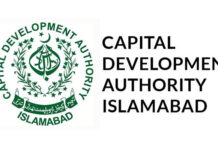


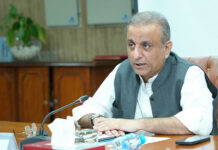














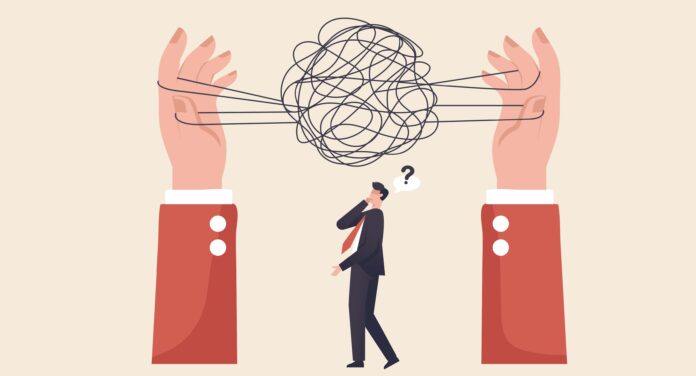





how are they preparing for worst point is completely missed. just sorry state of affairs is mentioned in this article.
one or two lines of specific plan of action to survive should have mentioned giving idea to reader how businesses are preparing to handle this uncertainty